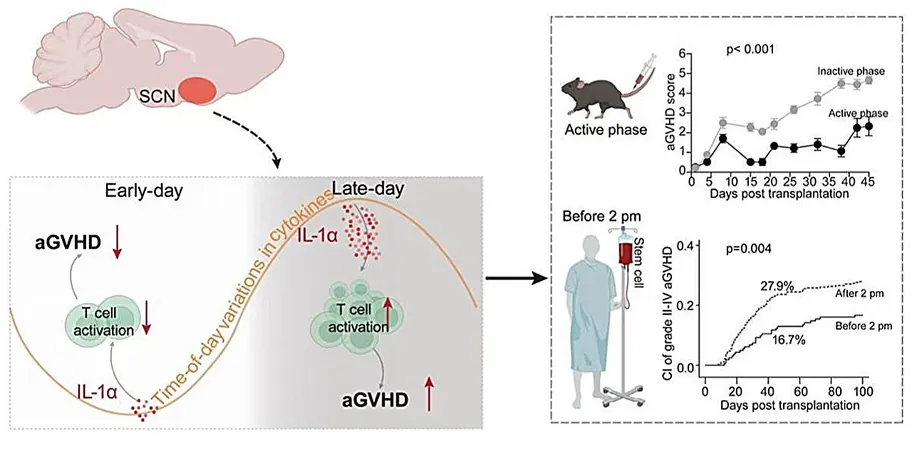
Breakthrough Discovery: How Stem Cell Infusion Timing Could Revolutionize aGVHD Prevention!
2025-03-31
Author: Ming
Introduction
In a groundbreaking study led by Prof. Zhan Cheng at the University of Science and Technology of China (USTC) and Chief Physician Zhu Xiaoyu from the First Affiliated Hospital, researchers have unveiled a crucial insight into how the timing of stem cell infusions can dramatically influence the incidence and severity of acute graft-versus-host disease (aGVHD) in allogeneic hematopoietic stem cell transplantation (allo-HSCT). This research, recently published in the prestigious journal *Cell*, highlights the surprising role that the recipient's circadian rhythms play in the process.
The Challenge of aGVHD
Allo-HSCT is a vital treatment option for various serious health conditions such as hematological malignancies, congenital immunodeficiencies, and bone marrow failure syndromes. Unfortunately, aGVHD remains a significant complication that often leads to transplant-related mortality, despite existing preventive measures.
The Innovative Approach
The innovative approach of the research team focused on the timing of stem cell infusion. Conducting experiments with animal models and analyzing clinical cohort studies, they discovered that infusing stem cells early in the day may serve as a straightforward yet powerful strategy for reducing the risk of aGVHD. This finding is a game-changer for transplant procedures, potentially offering a simple adjustment that could save lives.
Experimental Findings
To delve deeper, the researchers created MHC-mismatched and xenogeneic aGVHD mouse models, varying the times of stem cell infusion. Surprisingly, they found that while the timing of stem cell collection did not affect aGVHD development, the recipient’s circadian rhythms were pivotal in determining how soon and how severely aGVHD would manifest.
Clinical Validation
Further validating their findings, the team conducted a comprehensive single-center cohort study on peripheral blood stem cell transplantation, along with a multicenter study on haploidentical transplantation across China, confirming that their conclusions were indeed applicable in clinical settings.
Conclusion
This pivotal research opens doors for enhancing allo-HSCT protocols, providing hope for patients suffering from conditions that require stem cell transplants. As the medical field continues to explore the intersections of biology and treatment timing, this study promises to shift the paradigm in aGVHD prevention strategies, potentially leading to improved outcomes for countless patients in the future. Stay tuned as the implications of this study continue to unfold in the world of hematology and transplant medicine!

 Brasil (PT)
Brasil (PT)
 Canada (EN)
Canada (EN)
 Chile (ES)
Chile (ES)
 Česko (CS)
Česko (CS)
 대한민국 (KO)
대한민국 (KO)
 España (ES)
España (ES)
 France (FR)
France (FR)
 Hong Kong (EN)
Hong Kong (EN)
 Italia (IT)
Italia (IT)
 日本 (JA)
日本 (JA)
 Magyarország (HU)
Magyarország (HU)
 Norge (NO)
Norge (NO)
 Polska (PL)
Polska (PL)
 Schweiz (DE)
Schweiz (DE)
 Singapore (EN)
Singapore (EN)
 Sverige (SV)
Sverige (SV)
 Suomi (FI)
Suomi (FI)
 Türkiye (TR)
Türkiye (TR)
 الإمارات العربية المتحدة (AR)
الإمارات العربية المتحدة (AR)